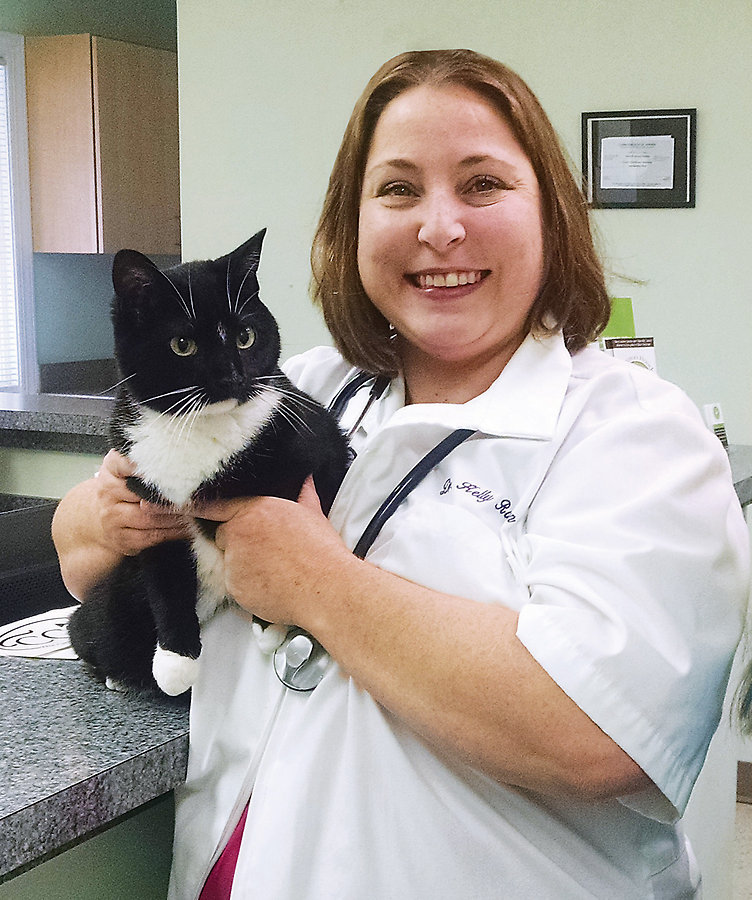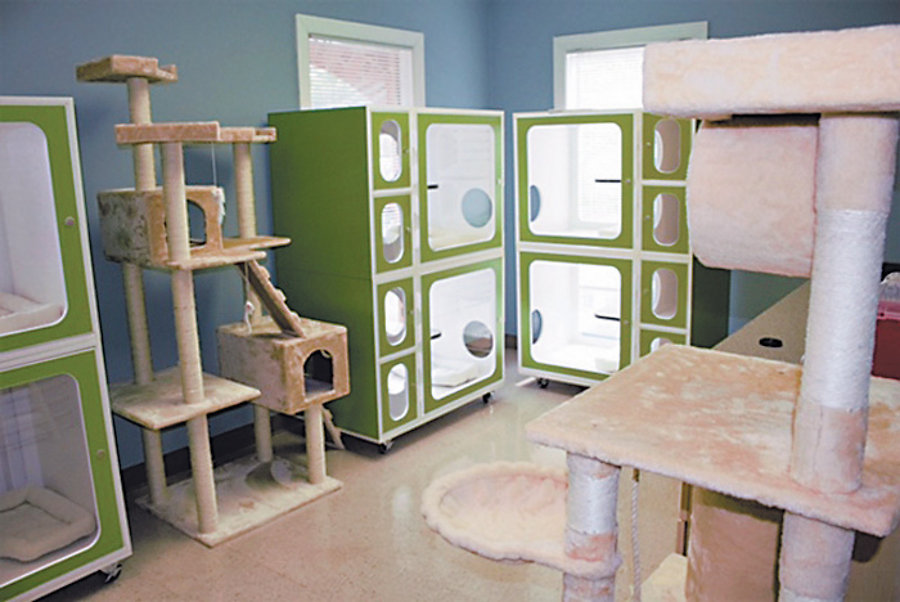THE CAT CLINIC OF CHESAPEAKE
Feline exclusive care and boarding for kitty companions
by Rob Lauer

Jude, and Dr. Ramthun
Kelly Ramthun, DVM, has no problem with being called a "cat lady." In fact, it's a title she wears with pride.
"I love cats," she proclaims. "I also have two dogs, who I love very much, but my love for cats is unique. It's an emotion that's hard to verbalize. You either are a "cat person' or you're not. Unlike dogs, cats don't beg for your affection. A cat doesn't live with you; you live with a cat. You have to earn a cat's respect. Everything is on their terms. When they want your attention, they let you know it. Cat people get all of this; they're okay with it. They know that cats aren't a dime a dozen- that each has its own personality. They know that you can't replace one cat with another. So, sure: call me a "cat lady,'" she says with a warm laugh.
Dr. Ramthun's lifelong love for cats led her to establish The Cat Clinic of Chesapeake.
"I didn't want to be just another vet on the corner," she explains. "I love all animals and I would treat any animal that needs help. I've been known to bring a squirrel in here that needed medical attention; but I have a special place in my heart for cats. And I know cat people. I understand them."
Step inside the waiting room of nearly any veterinary practice and one will discover that the majority of patients are canines. Taking one's dog into a room filled with other dogs of all sizes, breeds and temperaments has the tendency to put one on guard. Taking one's cat into such a setting can be completely unnerving.
The Cat Clinic offers a calming, welcoming environment to both cat people and the furry objects of their affections. The rooms are bright and airy. The walls are a soothing lime green. The reading material in the waiting room includes books filled with humorous poetry and observations about the finicky nature of cats.
"I love cats," she proclaims. "I also have two dogs, who I love very much, but my love for cats is unique. It's an emotion that's hard to verbalize. You either are a "cat person' or you're not. Unlike dogs, cats don't beg for your affection. A cat doesn't live with you; you live with a cat. You have to earn a cat's respect. Everything is on their terms. When they want your attention, they let you know it. Cat people get all of this; they're okay with it. They know that cats aren't a dime a dozen- that each has its own personality. They know that you can't replace one cat with another. So, sure: call me a "cat lady,'" she says with a warm laugh.
Dr. Ramthun's lifelong love for cats led her to establish The Cat Clinic of Chesapeake.
"I have a special place in my heart for cats.
And I know cat people. I understand them."
- Dr. Kelly Ramthun
And I know cat people. I understand them."
- Dr. Kelly Ramthun
"I didn't want to be just another vet on the corner," she explains. "I love all animals and I would treat any animal that needs help. I've been known to bring a squirrel in here that needed medical attention; but I have a special place in my heart for cats. And I know cat people. I understand them."
Step inside the waiting room of nearly any veterinary practice and one will discover that the majority of patients are canines. Taking one's dog into a room filled with other dogs of all sizes, breeds and temperaments has the tendency to put one on guard. Taking one's cat into such a setting can be completely unnerving.
The Cat Clinic offers a calming, welcoming environment to both cat people and the furry objects of their affections. The rooms are bright and airy. The walls are a soothing lime green. The reading material in the waiting room includes books filled with humorous poetry and observations about the finicky nature of cats.

The boarding room, complete with brightly colored condos and play areas
"Above all else, it is quiet," Dr. Ramthun says. "There's no loud barking- either in the waiting room or off in the examination rooms. There's nothing here to make your cat anxious or afraid."
The calming atmosphere extends beyond the waiting room to the clinic's examination rooms, its surgical and pharmaceutical units, and its boarding rooms.
"When people are going out of town, they can board their fur-babies here," Dr. Ramthun explains. "We have very spacious, multi-tiered "cat condos' that give our boarders lots of room for exercising." The brightly colored condos are placed near windows through which their temporary tenants can watch birds fluttering outside around equally decorative feeders. A large flat screen TV is mounted on the wall; calming nature videos featuring birds, butterflies and flowers, play throughout the day and night, providing visual stimulation for the four-legged guests. "We also have floor time," Dr. Ramthun adds, "but we do it on rotation so that cats only interact with cats that they know."
Sometimes following surgery or medical treatment, a cat is placed on prescription medication. If the owner has any concerns about their ability to administer the medication at home, they can board their cat at the clinic where Dr. Ramthun and her staff will oversee the process from beginning to end.
Dr. Ramthun's loving attention to detail has captured the hearts of local cat people.
"We've only been open for a year and already we have over 400 new patients," she says with pride. "Every week we get new ones. In fact, we're seeing four new kitties this week. Demand for our boarding services is up, too. The word of mouth really helps."
The doctor's experiences over the past year have also opened her eyes to who cat people are.
"In the wild when a cat experiences sickness or pain, they instinctively withdraw.
If she's hiding under the bed and won't come out-
that could be a sign that she's not feeling well."
- Dr. Kelly Ramthun
If she's hiding under the bed and won't come out-
that could be a sign that she's not feeling well."
- Dr. Kelly Ramthun
"There's a misconception that men prefer dogs to cats," she explains. "But we've had a lot of "cat gentlemen' come to us. Recently one gentleman brought in his sick cat, and there he was- a man in his 60s- with tears in his eyes because he was so concerned. His was an older cat with renal disease, that was having problems staying hydrated, so I taught him how to do fluid therapy at home."
The lifespan of the average indoor cat is 15 to 16 years. As they near that age, Dr. Ramthun says that people should be on the lookout for certain conditions.
"The fur on older cats will start to separate- meaning that the coat will start looking clumpy and unkempt," she describes. "Their eyes may start to glass-over. Older cats, like people, can develop dementia. They could start vocalizing for no apparent reason or start acting dazed and confused. If they begin to look thin or lose muscle mass, that's a sign that something might be wrong. If you notice urine spotting- at the first sign of blood in the urine or feces- you should bring them in right away."
"Animals can't tell us that they're feeling sick," Dr. Ramthun continues. "In the wild when a cat experiences sickness or pain, they instinctively withdraw: they find some place to hide. They probably do this to protect themselves from predators. Domestic cats behave the very same way when they're sick or in pain. So, if your cat becomes stoic or withdrawn- if she's hiding under the bed and won't come out- that could be a sign that she's not feeling well."
Dr. Ramthun also has advice for nurturing kittens. "The first thing you need to do- especially if you've gotten your kitten from a shelter- is make sure that they've been dewormed," she emphasizes. "Then handle them a lot to socialize them well. Handle their ears. Get them used to your fingers in their mouths. Handle their paws. Clip their nails. Kittens need plenty of love and attention. Later when they're taken to the vet, they'll be used to that sort of touching and won't be as likely to resist an examination."
Given Dr. Ramthun's love for felines, it's hard to imagine any cat- young or older- resisting her for very long.
The Cat Clinic of Chesapeake
133 Kempsville Road
Chesapeake, 23320
757-436-7877
CURRENT COLUMNS
Publisher’s Point 
Time To Moveby Jean Loxley-BarnardOn The Front Porch With You 
Memories of Homeby Rob LauerRelationships 
When Your Security Blanket is in the Dryerby Dr. Bill AustinChildren First 
Dandelion Timeby Becky Adams

